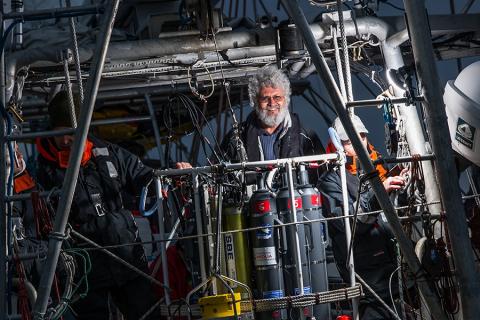- Home
- About
- OSD
- MyOSD
- Partners
- Work Packages
- WP 1Management & Coordination
- WP 2 (OSD)Ocean Sampling Day
- WP 3Oceanography & Environmental Data
- WP 4Standards and Interoperability
- WP 5Bioinformatics & Data Integration
- WP 6Exploring Ecosystems Biology
- WP 7Function and Biotechnology
- WP 8Intellectual Property (IP) Management for Marine Bioprospecting
- WP 9Dissemination & Outreach
- Public DeliverablesAll Micro B3's public deliverables
- Meetings
- Workshops
- Third Micro B3 Industry Expert Workshop
- Micro B3 Industry Expert Workshop
- Micro B3/OSD Analysis Workshop
- Micro B3 Stakeholder Workshop
- Micro B3 Summer School in Crete 2014
- Marine Metagenomics Bioinformatics
- Micro B3 Industry expert workshop
- EU-US Training 2013
- Micro B3 Statistics Training 2013
- MG4U Bioinformatics Training 2013
- Bioinformatics Training 2012
- EU-US Training 2012
Tara-Oceans: Systems ecology & Biology on the high seas
 It is 3 a.m. in mid-December 2010, an hour before dawn, and Tara is anchored amid an angry swell near the entrance to the Strait of Magellan. In the lee of Argentina's cliffs, the 36-metre schooner and her crew have sought haven against the impending weather that has earned these latitudes the nickname the Furious Fifties. But as the winds gather to hurricane force, they snap the safety cord that eases tension on the anchor chain. As the crew struggles to replace it, the storm crescendoes, plucking Tara's anchor from the seabed twice before it can be secured again.
It is 3 a.m. in mid-December 2010, an hour before dawn, and Tara is anchored amid an angry swell near the entrance to the Strait of Magellan. In the lee of Argentina's cliffs, the 36-metre schooner and her crew have sought haven against the impending weather that has earned these latitudes the nickname the Furious Fifties. But as the winds gather to hurricane force, they snap the safety cord that eases tension on the anchor chain. As the crew struggles to replace it, the storm crescendoes, plucking Tara's anchor from the seabed twice before it can be secured again.
Bracing himself inside the aluminium hull is Eric Karsenti. Compact and bright-eyed beneath a bushy mop of white hair, he has the air of a seasoned seafarer. But he is also an accomplished molecular cell biologist who has spent most of his career studying microtubules — rod-like structures that form part of the cell's internal scaffolding. Approaching retirement, he has switched fields, borrowed a famous fashion designer's yacht and launched a 2.5-year expedition around the world to survey ocean ecosystems in unprecedented breadth and detail. Motivated by a love of adventure as much as by science, Karsenti has found his share of both.
“This was really crazy,” Karsenti says later, reflecting on the trip from the safety of the European Molecular Biology Laboratory (EMBL) in Heidelberg, Germany. “I was on the boat for the worst leg of the whole expedition.”
The project, called Tara Oceans, set sail from Lorient, France, in September 2009 for a 115,000-kilometre voyage to collect plankton — microscopic marine organisms — at 154 distinct sites around the world. Findings from the expedition are now starting to be published, and the bulk of the data will soon be made publicly available.
Published in Nature 501, 20–23 (05 September 2013) doi:10.1038/501020a


